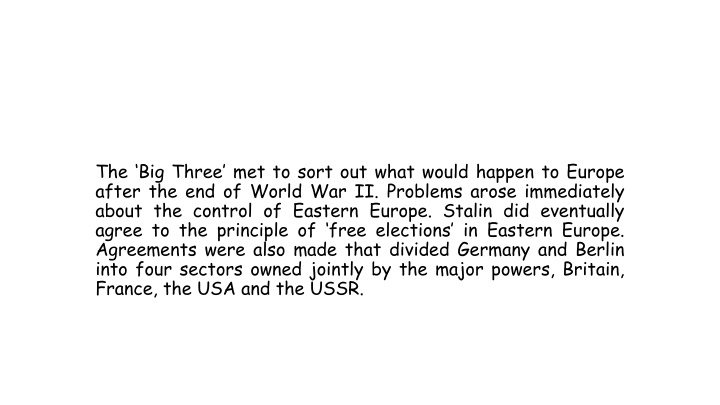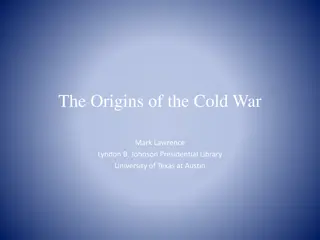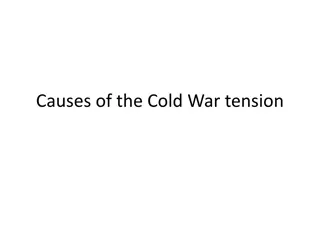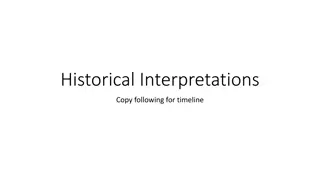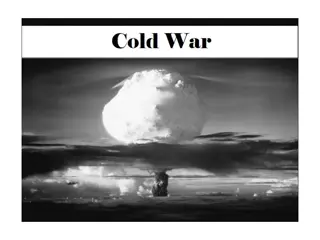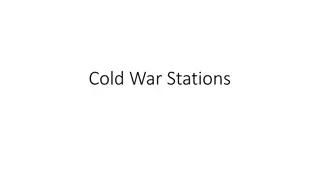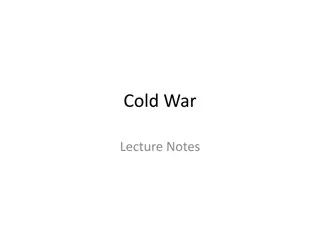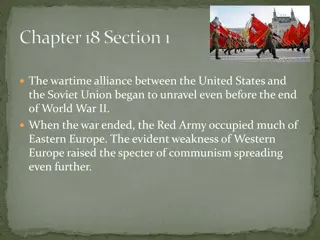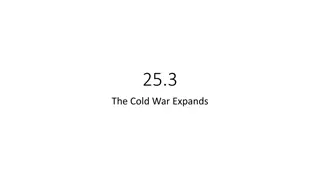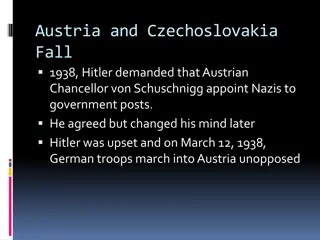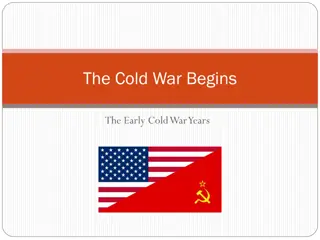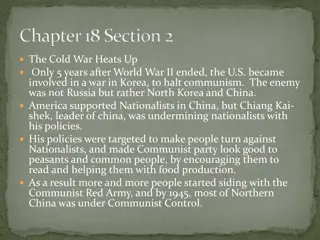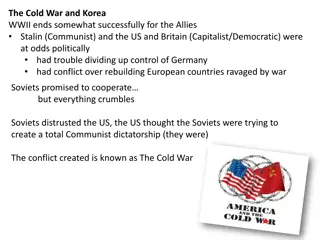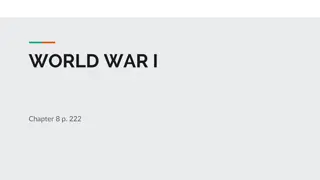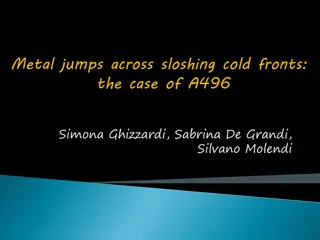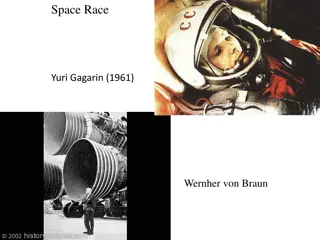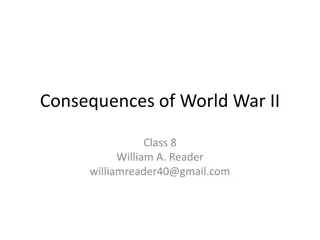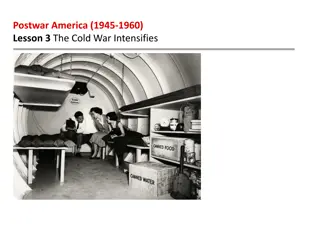Post-World War II Division and Cold War Tensions in Europe
Big Three leaders post-World War II agreement on Eastern Europe control, division of Germany, Truman confronting Stalin, atomic bombings, USSR's influence in Eastern Bloc, Truman Doctrine against communism, US financial aid to combat communism in Europe.
Download Presentation

Please find below an Image/Link to download the presentation.
The content on the website is provided AS IS for your information and personal use only. It may not be sold, licensed, or shared on other websites without obtaining consent from the author.If you encounter any issues during the download, it is possible that the publisher has removed the file from their server.
You are allowed to download the files provided on this website for personal or commercial use, subject to the condition that they are used lawfully. All files are the property of their respective owners.
The content on the website is provided AS IS for your information and personal use only. It may not be sold, licensed, or shared on other websites without obtaining consent from the author.
E N D
Presentation Transcript
The Big Three met to sort out what would happen to Europe after the end of World War II. Problems arose immediately about the control of Eastern Europe. Stalin did eventually agree to the principle of free elections in Eastern Europe. Agreements were also made that divided Germany and Berlin into four sectors owned jointly by the major powers, Britain, France, the USA and the USSR.
Roosevelt had died before this meeting and was replaced with Truman, and Churchill lost the election during this meeting and was replaced with Attlee. Stalin began to feel that he was not being shown the respect he deserved, especially by Truman, who attempted to intimidate Stalin with the news of the successful atomic bomb test in the USA.
Little Boy bomb, dropped on Hiroshima on 6 August 1945, had a capacity of 12,500 tons of TNT it killed 70,000 people within two seconds. Fat Man bomb, dropped on Nagasaki on 9 August 1945, had a capacity of 25,000 tons of TNT it killed 50,000 people within two seconds. Japan unconditionally surrendered on 14 August 1945.
Albania (1945); Bulgaria (1945); Poland (1947); Hungary (1947); Romania (1945 1947); Czechoslovakia (1945 48); East Germany (1949) Russia turned their zone of Germany into the German Democratic Republic in 1949.
An analysis of the foreign policy of the USSR and its possible future actions stated that the Soviet leadership were suspicious and aggressive and that there must be no compromises with the USSR. Only a hard-line approach would be effective in containing Communism. The analysis proved to be the basis for the Truman Doctrine.
The USA pledged $400 million to help Greece and Turkey as an attempt to stave off Communism. This was the first example of an active US policy to combat the threat of Communism in Europe.
The USA pledged money to help countries that wished to stave off Communism. More than $13 billion was given to a vast number of European countries, including Britain, France and West Germany. The USA made sure that all countries who took aid were now also major trading partners of the USA.
An organisation that was set up to co-ordinate Communist groups and parties across Europe.
Scheme to provide economic assistance to the countries of Eastern Europe.
An organisation to provide a more centrally co-ordinated approach to the threat of established military co-operation in the event of war, and included countries such as Britain, France, Canada and Belgium, as well as many smaller Western European nations. Communist expansion. This
The USSR secretly tested their first A-bomb a full six years earlier than the USA had expected them to. The radiation was detected, and thus the power balance of the Cold War had now dramatically been shifted.
A hunt for the Reds under the Beds took off in the USA. Fear of Communist sympathisers inside America grew.
In the light of the new nuclear threat of Communism, a strategy was developed that outlined the new direction that the USA s foreign policy needed to take in order to contain Communism. This new direction would now focus on rollback , the view that Communism needed to be confronted and pushed back to safeguard the free world.
An agreement that co-ordinated the defences of the Soviet Bloc under the control of the Soviet Union. Members were even more reliant upon the USSR for military aid in the event of internal or external attacks.
A speech denouncing Stalinism and the cult of the individual. It pointed out in clear terms how dictatorial the regime of Stalin was, and exactly how he purged the Communist Party of any possible threats using illegal methods, including torture, in the late 1930s. The speech seemed to many to herald a new era in the Communist Party.
A significant political victory for Khrushchev, who was able to highlight the underhand methods used by the USA to gain information. This event was particularly important as it was just before the two powers were due to meet at a peace conference in Paris. Khrushchev was furious at the blatant rudeness and betrayal that the USA had shown, remarking, Why shit where you are about to eat?! Khrushchev stormed out of the conference.
West Berlin had constantly been a thorn in the USSRs side; they had lost millions of workers across the borders. Khrushchev intended to stop West Berlin from undermining the control and power of the USSR.
The largest nuclear weapon ever detonated, in a test over the Arctic Ocean. The 57-megaton bomb was thousands of times more powerful than the atomic bomb dropped on Hiroshima.
The relationship between the USA and Cuba had deteriorated so much that they had looked to the USSR for help. In return for trade, the USSR was placing nuclear warheads and missiles on Cuba, only 60 miles away from mainland USA, meaning 90% of the USA was within range of the missiles that would take only five minutes to reach them.
Congress passed a unanimous vote, followed by a virtually unanimous vote of 88-2, in the Senate, giving President Lyndon Johnson the authority to send American troops to Vietnam and to use all necessary measures to repel armed attack .
A period of political liberalisation in Czechoslovakia. It began on 5 January, when reformist Slovak Alexander Dub ek came to power, and continued until 21 August, when the Soviet Union and members of its Warsaw Pact allies invaded the country to halt the reform.
After two and a half years of negotiation, the first round of discussion was brought to a conclusion, when President Nixon and General Secretary Brezhnev signed the ABM Treaty and the Interim Agreement.
This country was seen by Moscow as an important buffer state. Soviet troops were sent in to support the government against the Islamic Mujahedeen. America put a ban on the export of grain to Russia, ended the SALT talks taking place then and boycotted the Olympic Games due to be held in Moscow in 1980.
Poland, Hungary, Czechoslavakia, Romania, Bulgaria and Albania all rejected communism as a political system.
Gorbachev and Bush established a good working relationship. No new agreements were made, but both leaders declared that the Cold War was over.
With the Eastern Bloc becoming more independent, the Soviet empire itself began to crumble. On 8 December, the Soviet Union ceased to exist.
